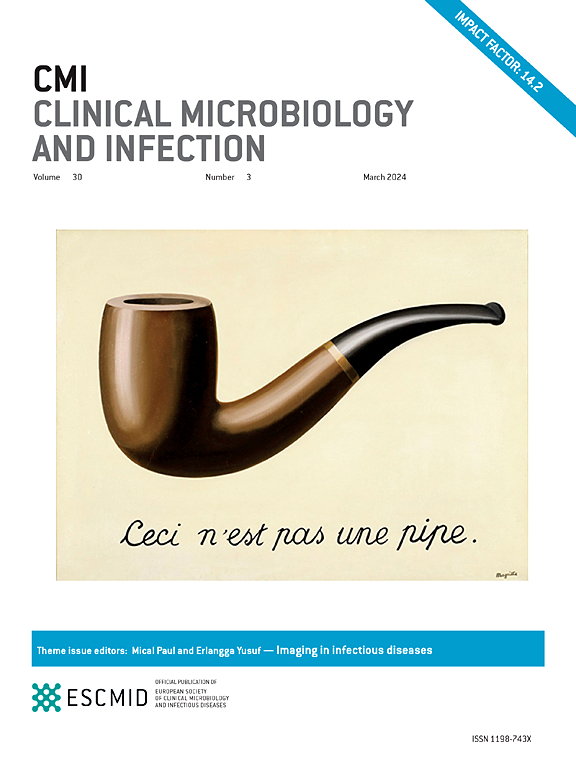Interventions targeting the nasal microbiome to eradicate methicilin-resistant Staphylococcus aureus
IF 10.9
1区 医学
Q1 INFECTIOUS DISEASES
引用次数: 0
Abstract
Background
Staphylococcus aureus is an important pathogen in many sites, including the bloodstream, skin and soft tissue, bone and joints. When infection is caused by methicilin-resistant S. aureus (MRSA), therapy is more difficult and outcomes are less favourable. Nasal colonization is associated with increased risk for MRSA infections. The nasal microbiome may play a role in risk for nasal colonization and infection.
Objectives
To review the role of the microbiome in MRSA nasal colonization and infection.
Sources
Peer-reviewed literature identified in a MEDLINE search using MRSA, S. aureus, prebiotic and microbiota as search terms.
Content
Reduction of S. aureus nasal colonization has been shown to reduce risk of S. aureus infections, but decolonization methods are imperfect. The role of the nasal microbiome in host defence against S. aureus colonization and infection is explored. Numerous organisms have been shown to be negatively associated with S. aureus colonization. The antimicrobial molecules produced by these organisms are an active area of research.
Implications
Future research should focus on development of safe and effective molecules that can inhibit S. aureus in the nasal vestibule. Damage to the diverse nasal microbiota by unnecessary antibiotics should be avoided.
针对鼻腔微生物组的干预措施可根除 MRSA。
背景:金黄色葡萄球菌是许多部位的重要病原体,包括血液、皮肤和软组织、骨骼和关节。当感染由耐甲氧西林金黄色葡萄球菌(MRSA)引起时,治疗会更加困难,疗效也较差。鼻腔定植与 MRSA 感染风险增加有关。鼻腔微生物组可能在鼻腔定植和感染风险中发挥作用:回顾微生物组在 MRSA 鼻腔定植和感染中的作用:来源:以MRSA、金黄色葡萄球菌、益生元和微生物群为检索词,在Medline检索中发现的同行评审文献:减少金黄色葡萄球菌的鼻腔定植已被证明可降低金黄色葡萄球菌感染的风险,但去菌落的方法并不完善。本文探讨了鼻腔微生物组在宿主防御金黄色葡萄球菌定植和感染中的作用。许多生物已被证明与金黄色葡萄球菌的定植呈负相关。这些生物产生的抗菌分子是一个活跃的研究领域:未来的研究应侧重于开发可抑制鼻前庭金黄色葡萄球菌的安全有效的分子。应避免不必要的抗生素对多样化的鼻腔微生物群造成损害。
本文章由计算机程序翻译,如有差异,请以英文原文为准。
求助全文
约1分钟内获得全文
求助全文
来源期刊
CiteScore
25.30
自引率
2.10%
发文量
441
审稿时长
2-4 weeks
期刊介绍:
Clinical Microbiology and Infection (CMI) is a monthly journal published by the European Society of Clinical Microbiology and Infectious Diseases. It focuses on peer-reviewed papers covering basic and applied research in microbiology, infectious diseases, virology, parasitology, immunology, and epidemiology as they relate to therapy and diagnostics.

 求助内容:
求助内容: 应助结果提醒方式:
应助结果提醒方式:


